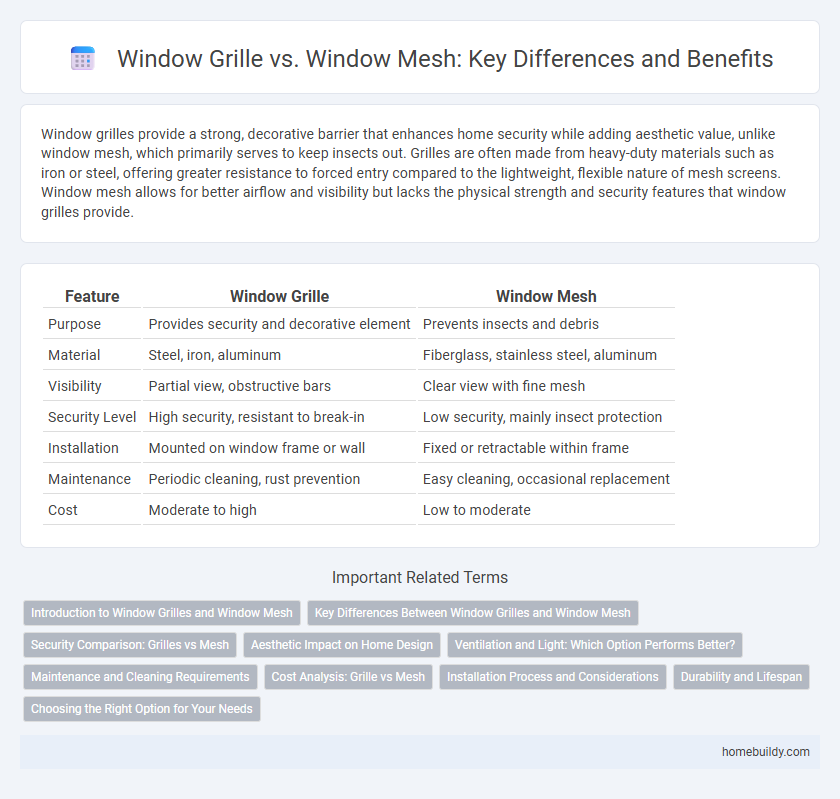Window grilles provide a strong, decorative barrier that enhances home security while adding aesthetic value, unlike window mesh, which primarily serves to keep insects out. Grilles are often made from heavy-duty materials such as iron or steel, offering greater resistance to forced entry compared to the lightweight, flexible nature of mesh screens. Window mesh allows for better airflow and visibility but lacks the physical strength and security features that window grilles provide.
Table of Comparison
| Feature | Window Grille | Window Mesh |
|---|---|---|
| Purpose | Provides security and decorative element | Prevents insects and debris |
| Material | Steel, iron, aluminum | Fiberglass, stainless steel, aluminum |
| Visibility | Partial view, obstructive bars | Clear view with fine mesh |
| Security Level | High security, resistant to break-in | Low security, mainly insect protection |
| Installation | Mounted on window frame or wall | Fixed or retractable within frame |
| Maintenance | Periodic cleaning, rust prevention | Easy cleaning, occasional replacement |
| Cost | Moderate to high | Low to moderate |
Introduction to Window Grilles and Window Mesh
Window grilles consist of decorative or protective bars installed on windows, providing security and enhancing the architectural style of a building. Window mesh, typically made from fine metal or fiberglass, functions primarily as an insect screen while allowing ventilation. Both serve distinct purposes--window grilles focus on security and aesthetics, whereas window mesh emphasizes pest control and airflow.
Key Differences Between Window Grilles and Window Mesh
Window grilles consist of sturdy bars or metal designs installed on windows primarily for security and aesthetic purposes, whereas window mesh uses fine, woven screens designed to prevent insects and debris from entering while allowing airflow. Grilles offer a physical barrier that is more robust and visible, often customizable in design and material, while mesh emphasizes protection against pests with minimal visual obstruction. The choice between the two depends on whether security or ventilation and insect control is the priority for the window application.
Security Comparison: Grilles vs Mesh
Window grilles offer robust physical barriers made from strong metals like steel or iron, significantly enhancing security against break-ins compared to window mesh, which primarily acts as a deterrent against insects rather than intruders. Mesh screens, typically made from fiberglass or aluminum, provide limited resistance to forced entry, making grilles a preferred choice in high-security applications. For optimal protection, grilles with reinforced locking mechanisms outperform mesh in preventing unauthorized access while maintaining ventilation and visibility.
Aesthetic Impact on Home Design
Window grilles enhance home design by adding architectural interest and defining style, available in various patterns and materials that complement both traditional and modern aesthetics. Unlike window mesh primarily designed for insect protection, grilles serve as a decorative element that can increase curb appeal and visual texture. Choosing a grille over mesh allows homeowners to customize the window's appearance, making it a focal point rather than just a functional barrier.
Ventilation and Light: Which Option Performs Better?
Window grilles provide superior ventilation compared to window mesh due to their sturdy bars that allow larger airflow while maintaining security. In terms of light transmission, window grilles block less natural sunlight than denser window mesh, which often dims interior spaces. Choosing window grilles can enhance both ventilation efficiency and natural light infiltration, making them a preferred option for well-lit, airy environments.
Maintenance and Cleaning Requirements
Window grilles require periodic cleaning to remove dust and debris, typically needing occasional wiping or dusting due to their solid metal or wood construction. Window meshes demand more frequent maintenance, as their fine mesh can accumulate dirt, pollen, and insect remains, requiring gentle washing with soap and water to maintain visibility and airflow. Both window grilles and meshes benefit from regular inspection to prevent corrosion or damage, ensuring durability and optimal performance.
Cost Analysis: Grille vs Mesh
Window grilles generally have higher upfront costs due to materials like wrought iron or steel and labor-intensive installation, while window mesh offers a more affordable alternative with lower material and installation expenses. Maintenance costs for grilles tend to be higher over time because of rust prevention and repainting, whereas meshes require less upkeep and occasional replacement. Budget-conscious homeowners often prefer window mesh for cost-efficiency, but those prioritizing security might invest more in durable, robust window grilles despite the higher total cost.
Installation Process and Considerations
Window grille installation involves securely fixing metal or wrought iron bars onto the window frame, requiring precise measurements, drilling, and anchored mounting for enhanced security. In contrast, window mesh installation typically involves fitting a lightweight, fine screen material within a frame, which is then easily attached or clipped onto the window opening for insect protection. Key considerations for window grilles include durability and security standards, while window mesh focuses on ventilation, visibility, and ease of replacement.
Durability and Lifespan
Window grilles, typically made from robust metals like wrought iron or aluminum, offer superior durability and a longer lifespan compared to window mesh, which is often constructed from fiberglass or plastic materials prone to wear and tear. Metal grilles resist corrosion, physical damage, and extreme weather conditions, ensuring long-term security and structural integrity. In contrast, window mesh requires more frequent replacement due to susceptibility to tearing, UV degradation, and reduced strength over time.
Choosing the Right Option for Your Needs
Window grilles offer enhanced security and aesthetic appeal by providing sturdy, decorative bars over windows, while window mesh primarily serves as a barrier against insects and debris with its fine screen material. Choosing the right option depends on your priorities: opt for window grilles for robust protection and architectural enhancement, whereas window mesh suits those focused on ventilation and pest control. Consider factors such as security requirements, aesthetic preferences, and local climate conditions to determine whether window grilles or window mesh best meets your needs.
Window grille vs Window mesh Infographic

 homebuildy.com
homebuildy.com